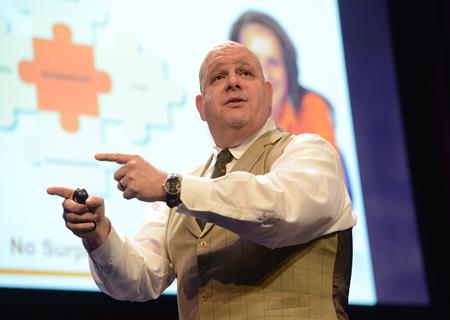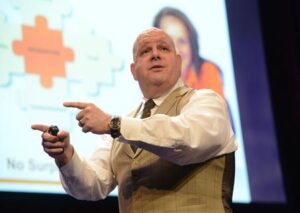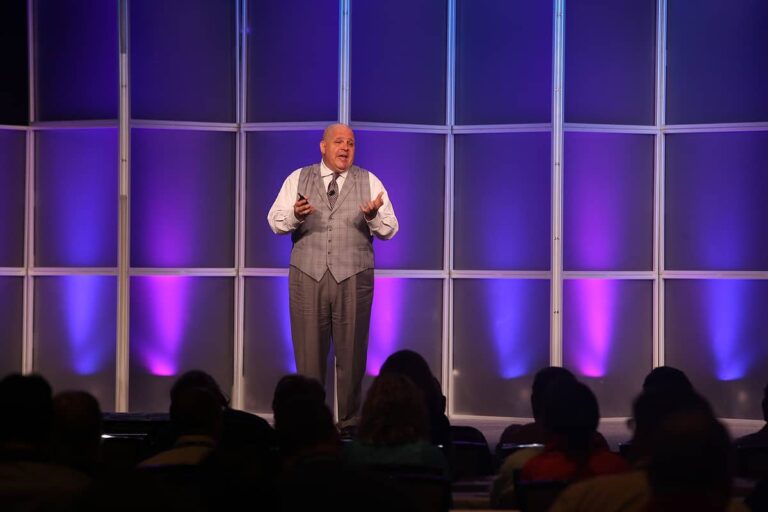
I have spent the last 20 years of my life as a professional speaker, trainer and business consultant. I travel between 150 – 220 days year worldwide. Last year I did two full trips around the world and spoke in 12 different countries. My current fee is between $20,000 and $30,000 for one day of speaking or training. Below you will find some of my very best ideas and advice on what it takes to achieve a high level of success in the professional speaking business.

1. The first step is finding a topic to speak about that brings out the passion in you, that you are highly knowledgeable in, AND there must be a large customer base – with money – willing to pay you to talk about it.
I know lots of speakers who are deeply passionate about topics that no one will spend significant cash to listen to. If you simply want to speak as a hobby, that is absolutely fine, but if you want to make a substantial income from your speaking or training business, then you have to pick a topic which organizations see as highly important.
Your topic has to be so valuable to clients that they are willing to write you a check for $10,000 to $50,000-plus for one day’s work.
Do you think that’s an exorbitant amount of money to charge?
Well, just keep in mind if you stand in front of several hundred executives from a top company and give them great ideas, credible information and useful tools and techniques, that is entirely possible to use the information you teach them to save millions of dollars for their companies, and/or generate millions of dollars in additional profit.
So, spending $50,000 to generate several million dollars and benefit is a pretty darn fair exchange of value.
2. In addition to your personal experience, you’re going to have to invest significant time, energy and money on study and research to gain more knowledge about your topic.
I teach about business leadership, winning culture, high performance teams, strategy, customer service and business excellence, and as you know from the first part of this book, I still read more than 120 topical books annually. In large part, because of my commitment to lifelong learning, I have won several prestigious awards recognizing me as one of the top business experts in the world.
Trust me, I am not THAT smart. I simply am very, very focused.
I know these are the topics my clients want to better understand and they are willing to pay big bucks for a highly recognized international business thought leader to deliver valuable information to them.
In your venture, YOU will need to consistently deliver massive value (whether that is education, entertainment, motivation or instruction) every time you step up to the podium.
3. In addition to reading and studying other people’s information and data, you should start collecting your own data.
Ask people questions in your workshops, send out surveys, or do focus groups. Look at all the ways you can collect your own unique research. It’s valuable stuff.
For example, I sent out a survey to several hundred high-potential employees at top-tier companies around the world, asking them to fill it out and then share it with their high-potential colleagues. As a result, I was able to get thousands employees at Fortune 100 companies to answer a survey about leadership, engagement and work satisfaction – research that no one else in the world has.
It is research I now can build classes around – ones that are differentiated and highly valuable.
4. Start collecting REAL business stories from your clients and add them to your own personal experiences.
It’s great to know a whole bunch of the famous business stories from books and other research, but you need to build credibility by giving people new meaningful and helpful stories to illustrate your points.
My only caution here is make sure that they are valuable – no fluff, no silly scenarios, no boring stories, and not a ton of anecdotes about YOU – only real, interesting and highly valuable business situations you have personally collected from clients.
The stories need to help the audience better understand the ideas and information you’re sharing.
Remember it is all about what is important to the audience – what they want to learn and what will add value to them. It is something I learned early in my career: You are not a sage on the stage; you are a guide on the side AND the only critic whose opinion counts is the customer.
5. As soon as you designate speaking topics, do research to find out who are the true thought leaders in that field.
Who are the people your potential clients look up to in that niche? Who have written top selling books? Who have the most followers on Twitter, Facebook and LinkedIn?
Then, begin to follow those people. Read their blogs, read their books and listen to their podcasts.
Then, reach out to them with good, honest, thoughtful comments, feedback and questions. Over the course of months and years, you will establish a real relationship with them.
The goal here is to be authentic. You’ll build the relationship by adding value, not by wasting their time.
When I looked around my field, I realized people like Seth Godin, Tom Peters, Tim Sanders, Guy Kawasaki, Jim Kouzes, Marshall Goldsmith, Tom Morris, Joe Calloway and several other top speakers were individuals I wanted to know, so I have been reaching out to them consistently with comments, ideas and information.
It helped establish peer-to-peer relationships and genuine friendship. Now, 10 years later, I consider many of them as friends and talk to them often.
We share research and data, and it adds tremendous credibility when I mention their names and ideas to my audiences.
6. Put yourself in places where you’ll have opportunity to meet global thought leaders on topics on which you plan to speak.
In my career, I have had the chance to meet and talk with people like Colin Powell, Alan Greenspan, Steve Wozniak, Jack Welch, Mark Cuban, Sam Walton, Sergey Brin, Larry Page, Elon Musk…and many others.
When I get a chance to meet someone like this, I make it a point to ask them an important question related to leadership or business. This lets me learn from them, and I walk away with a wonderful piece of information I can share with my audiences.
You know, things like, “When I was talking to Steve Wozniak at a recent Apple meeting, he told me….” Done with finesse, it’s a great way to build credibility without seeming like too much of a name dropper.
7. If you’re going to deliver speeches in the business arena, being a guest lecturer or adjunct professor at a prestigious business school also adds a huge amount of credibility.
I’ve had the great honor to be a guest lecturer at the Wharton School of Business for the past 19 years. In total, I have lectured at more than 90 universities and colleges.
To a prospective business client this gives them a great deal of comfort in knowing that top universities have sought me out as an expert.
By the way, most of these invitations have come from audience members who are alumni at these universities and invite me to present or introduce me to key faculty members who might want me to share my ideas and expertise with their students and I get paid to deliver these speeches.
8. If you are going to target a certain kind of customer, the very best way is to get in front of an association or group they belong to or speak at a major convention they are attending.
It is difficult, if not impossible, to sell speeches by cold calling major corporations and it is completely impossible to get a high-quality speakers bureau to represent you until you have a solid track record with an impressive client list.
So, a major focus has to be on getting in front of the right people at large meetings and conventions so that you can demonstrate your expertise in front of a huge group of your target customers.
I have been extremely fortunate to be invited to speak at the American Society of Association Executives, Professional Convention Management Association, Women in Foodservice Forum, Million Dollar Round Table, and other big events that ultimately have driven dozens of new engagements my way.
This is where the leverage is. Getting in front of a group that represents thousands of your target customers is big stuff.
However, it is NOT easy to earn a spot at one of these events; they are exceedingly selective and do a great deal of research prior to inviting speakers.
These groups demand talent, value, professionalism and an assurance that speakers don’t waste their attendees’ time. They also have no problem whatsoever paid $30,000 or more for a keynote speech.
9. Speakers bureaus: Although there are hundreds of speakers bureaus out there, there are very few high-level speakers bureaus that will accept you and unless you are billing at a minimum of $10,000 a speech.
There simply isn’t enough money in it them for them to put forth the effort to sell you. Typically, a speakers Bureau takes 25% and sets up the entire contract.
I work with several speakers bureaus and they are wonderful people and send me a few speeches each year. Not enough to build my entire business on, but definitely a good source of clients.
Important note: once a speakers bureau books a client for you they own the client. Never, ever go around the speakers bureau and try to cut a deal with the client directly, it will destroy your relationship with them and your reputation in the industry.
10. I believe the mark of a true professional speaker is how often they get invited back to talk to the same organization.
I know a lot of speakers that are great at selling speeches, but then they deliver mediocre programs and never get invited back. They spend 90 percent of their time trying to SELL speeches and 10 percent of their effort making their speeches highly valuable.
I would recommend they invert those figures, spending most of their effort on building world-class presentations. Once you close a few engagements and do a stellar job, word of mouth will drive the success of your business.
Case in point, I have had most of my clients for 10 or more years. They bring me back year after year to talk about different subjects or offer a refresher for presentations made years earlier. I have at least 10 clients that I’ve been delivering programs to for 15 years or more.
Don’t focus on slick sales techniques, giant social media crusades, or direct mail campaigns.
Instead, focus on being so incredibly valuable, authentic, knowledgeable, and easy to work with that your current clients will want you to come back often. They’ll also be such big fans that they’ll recommend you to their colleagues and help send more business your way.
11. In the early stages of your career you will probably have to do a fairly large number of free speeches.
As a beginning speaker, the practice in front of a live audience is always helpful. It will allow you to craft your message and work on your delivery.
When I started, I accepted just about every offer to present. Then, when people started to call me about potential speeches, I began charging a nominal fee of $500 – $1,000. I slowly worked my way up from there, increasing my prices every other year or so to get where I am today – in the $20,000-$30,000 range per speech.
Now, when someone asks me to give a free speech (and I want to help them by giving the speech), I tell them my normal rate, but add that I would be happy to give a presentation without compensation IF they donate $1,000+ to a charity that I support. Nearly everybody gladly makes a contribution.
For those who tell me they don’t have a thousand dollars, I politely decline because I know they will not value my time.
I do, however, give a couple of speeches per year where the client only pays travel and expenses. Why? Well, I KNOW the audience is full of potential customers! If they can put me in front of 2,000 or 3,000 people who work for target client companies, I am willing to look at this opportunity as a marketing investment.
Once you start charging for speeches, the only reason you should reduce your fee is if the audience is a perfect match for your Ideal Target Client, there are decision-makers in the audience, if the event location is a place on your bucket list, or it is for a charity that you deeply believe in and want to support.
If you lower your fee for a client company they will expect you to always honor the lower fee and might possibly share fee with other companies they recommend you to and you will be locked in to honoring lower fee for them as well.
Set the highest reasonable fee you can command and then stay consistent and always charge something very close to your fee.
12. Please note I’ve stated that “I” tell the client my normal fee, but it’s actually my wife who negotiates with all our clients.
We have found it is much easier for her to explain the value I bring and why we charge what we do rather than for me to try to defend my worth. It’s teamwork that gels!
In the beginning we were worried our clients might view us as a “mom and pop shop,” but we have found out our clients love dealing with my wife and her team. Some even insist she join me when I travel to deliver my program.
Because we have no kids, my wife travels with me quite often. It’s a wonderful lifestyle business, one in which I get paid to travel around the world with my spouse, meet nice people, and help them.
Whether it is your spouse, partner, employee or an agent, the key point here is it’s often easier for someone else to sell your value and negotiate for a higher price than it is for you to discuss with the client about why you are charging what you charge for you!
13. What tools do you need to sell a speech or training workshop?
First, you will need an excellent website that is clean, professional and highly focused on your target audience. You will also need a listing of topics and workshops you can deliver with clear descriptions about what is covered and how it will benefit the attendees.
Next, you will need a professionally edited high-definition video which showcases your work, a professional head shot, and some professional pictures of you delivering speeches.
If you don’t have the money to shoot the video and pictures, consider trading out a free speech where they will have a videographer and photographer on hand who will give you everything they shoot.
To understand the level of quality your website, photos and video will have to be, simply Google eight or ten of the top speakers in the arena you plan to go into and very carefully study their website.
Having a book is also helpful, but if it is to have any real clout it needs to come from a large publishing house. Today, anybody can print out their own book or write an e-book, so the value of writing a self-published book is not nearly so substantial.
Be forewarned; it is exceedingly difficult to get a book published by a major publishing house. It’s a topic heavily written about, so I won’t try to cover it here. Once, however, you have everything I just mentioned in order, you have the minimum requirements in place to sell a professional speech.
14. As a speaker, you are the product. And to effectively sell product it is critical that you take the time to develop a very clear “brand” to represent you and your work in the marketplace.
To do this you need to determine such things as:
- What do I want people to think and feel when they hear my name?
- What do I want to be recognized for in the marketplace?
- What sort of imagery and colors will represent my brand?
- What are my “owned words” or tagline?
- What is my unique value proposition?
- How does my brand match my target audience?
- What other brands do my target audience admire?
- Who are the top speakers in my arena and how have they branded themselves?
- How will my brand stand out as unique, compelling and valuable?
Then you must be extremely consistent in branding all of your materials; your website, your logo, your business cards, your videos, your blog, your podcast, your products, even the clothes you wear on stage, everything you do must be “on brand.”
15. Personal referrals from clients and colleagues is absolutely the most powerful way to get new business, but another great way to gain exposure, build your brand and garner new clients is through social media.
Again, this is a topic that has been broadly written about by people who know a whole bunch more about it than I do, but here’s what I will tell you…
A big part of being a successful professional speaker or executive trainer is to build a very large group of followers who support you and love your work. As Seth Godin likes to say you need to build a “tribe.”
My recommendation would be to look at your target audience and see what types of social media they use the most. For my particular audience, business people, I have found that a Facebook fan page, LinkedIn profile and twitter account are the most effective social media platforms for me.
My blog has also been a tremendously important part of growing my tribe and keeping my customers highly involved in my brand.
The key to success with a blog is consistency, whether it’s once a day, once a week or twice a month your followers need to know that you will consistently deliver very high-quality content at regular intervals. I have also used videos very effectively inside of my blog, what are called vlogs, as a powerful way to present my ideas.
The goal is to pick just a few platforms which connect best with your target audience and then stick to those and do them VERY well. Another key way to use social media to grow your business is to connect with opinion leaders in your area of expertise who have built huge numbers of followers.
A few of the people I work with have anywhere from 500,000 to 1 million+ followers. When I put out a blog, video or tweet I think is especially valuable, I send an email or DM to these key contacts and ask them if they would take a minute to post a link to it across their various social media platforms.
I can say from experience when a very well-known speaker /expert retweets a link to your blog, you can get thousands of people going there to read it. This is totally free marketing and it is unbelievably powerful.
However, keep in mind you will very rarely sell a major speech strictly through social media, it is simply a tool to extend your reach and brand and to keep your past clients apprised of any new programs, speeches or products you have developed.
16. Once you’ve built up a good speaking business, developed a lot of quality content and expertise, collected a large tribe, built a substantial email list, and connected with key opinion leaders in your marketplace, it is time to begin to monetize your content.
This might be through videos, training courses, coaching, e-books, webinars or any other products you can sell to your target market.
As a speaker who travels more than 200 days a year and is consistently booked 18 months out, I understand clearly that I don’t have any more time to sell. The only way for my business to grow is through passive income generated by selling products based on my most valuable content.
Currently, I am putting together several new e-books, video training programs and paid webinars. Done properly, I anticipate these should be able to generate several hundred thousand dollars a year in additional income. Once again, this is not a topic I’m an expert on but there are some magnificent podcasts and books on the market written by people who are already extremely successful at Internet marketing and the sale of informational products.
Two of my favorite are Pat Flynn and Amy Porterfield, and if you listen to their podcasts they will recommend several other superb Internet marketers.
17. Once you get to a level of success in the profession, I would highly encourage you to start a mastermind group with other professional speakers at – or above – your level.
I am in a mastermind group with five of the top sales trainers in America, and I have learned a ton from them. We get on the phone about once a month to share our best ideas and suggestions, help each other out, and refer business to one another. It has been a valuable relationship for all of us.
Before you achieve a high level of success another great way to learn is through investing in a professional speaking training program. There are many excellent online training programs from top speakers, who will basically become your mastermind for building a successful speaking business.
IMPORTANT: be sure to research the people selling the online training course to make sure that they are actual successful speakers.
There are a lot of people selling courses who have never achieved a high level of success as a professional speaker, so there basically trying to tell you how to do something that they have never done.
The right course, by reputable speakers, can save you years of pain, misery and costly mistakes and give you a huge head start in building your speaking business.
For example, the online professional speaker training course I created with my friend and colleague, Matt Tenney, who is also a successful speaker, can help you launch and quickly grow a highly-successful speaking business.
If you’d like to learn more about our training and coaching program, please CLICK HERE.
I hope you found this helpful. – John Spence


